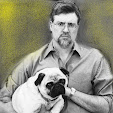 About a week ago, I finished reading The Big O (2007), the second crime novel by Declan Burke. It's a compelling, strange, and original novel, marked by the strength of its super-kind, stable, and non-violent protagonist Ray who kidnaps and holds people for hire. Ray isn't just likable; he's chivalrous and falls in love with a part-time heister, Karen. Ray is planning on going straight -- maybe the book's only troubling cliché -- but takes on one last assignment, kidnapping a crooked plastic surgeon's soon-to-be ex-wife. A handful of colorful secondary characters -- a screwy ex-con, his narcoleptic sidekick, a sexy woman cop, a scary giant dog, and so on -- weave in and out of the story. The ending is odd and amusing, combining farcical revelation and viciousness. I won't reveal more.
About a week ago, I finished reading The Big O (2007), the second crime novel by Declan Burke. It's a compelling, strange, and original novel, marked by the strength of its super-kind, stable, and non-violent protagonist Ray who kidnaps and holds people for hire. Ray isn't just likable; he's chivalrous and falls in love with a part-time heister, Karen. Ray is planning on going straight -- maybe the book's only troubling cliché -- but takes on one last assignment, kidnapping a crooked plastic surgeon's soon-to-be ex-wife. A handful of colorful secondary characters -- a screwy ex-con, his narcoleptic sidekick, a sexy woman cop, a scary giant dog, and so on -- weave in and out of the story. The ending is odd and amusing, combining farcical revelation and viciousness. I won't reveal more.One interesting point, I think: many of the reviews/blurbs peg Burke as an Irish writer, which he is, but The Big O is not dripping with the overt markers of Ireland -- in terms of landscape, cultural reference, and so on. The plastic surgeon's and his circle's social life generically revolves around a country club. Could be a Dublin suburb -- or a Chicago suburb, perhaps. I recently faced some mild criticism for not geographically locating some stories (and some self-doubt, too), but I like novels (and films) sometimes that seem as if they could be in any city or town, a generic place that could be almost anywhere. David Lynch's Blue Velvet (1986), for instance, depends on its weird surreal, small town setting -- and some of its effect would be mitigated if we all thought the action was isolated to a place like Eureka, California, or Roseburg, Oregon.
A final note: I saw on Burke's blog (Crime Always Pays) that Harcourt passed on publishing his follow-up book, which is a sequel. I don't know that The Big O demands a sequel or a series (which is not a criticism: there is something satisfying in a book that ends, and you know it's going to stay that way), but the publishing industry seems to want them. Maybe Burke stumbled or The Big O has not produced the sales that Harcourt expected, but the situation is depressing. It would be great to see more unusual, crafty crime books out there. My guess is that some other house will pick up the next book, but it might not be one that has the visibility or muscle of Harcourt (which might be less important these days, for all I know).
***
Addendum: Burke responds to my comments here.

